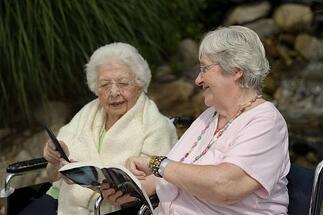 National Rehabilitation Awareness Week is September 15 -21 and senior communities like assisted living are taking time to spotlight the quality rehab services offered by both skilled care facilities and senior care residences. These facilities help seniors in their post-surgical care, aiding their recovery and enhancing their quality of life.
National Rehabilitation Awareness Week is September 15 -21 and senior communities like assisted living are taking time to spotlight the quality rehab services offered by both skilled care facilities and senior care residences. These facilities help seniors in their post-surgical care, aiding their recovery and enhancing their quality of life.
From Skilled Care Facilities to Custodial Care
Some seniors require intensive rehabilitation after a chronic illness or surgery; while others may need outpatient care involving a variety of therapies and treatment. In skilled care facilities, not only do they cater to seniors who need a high level of medical management, but skilled care communities also evaluate long-term care needs and determine a senior’s ability to continue living alone or assist in her custodial care.
Custodial care is any living arrangement that provides assistance with personal needs, like walking, eating or bathing rather than medical needs. Family members or health aids often assume this role in the home environment; other settings include assisted living or skilled care facilities. Seniors who live in a skilled care environment have opportunities for supervised exercise and recreational activities that may be a convenient part of their continuing therapy.
Many rehabilitation patients return to their own homes or a supportive living community after recovery. Rehab services are generally offered to seniors eligible for Medicare reimbursements.
Types of Rehabilitation Services in Skilled Nursing Facilities
Skilled nursing provides seniors with access to a concentrated team of healthcare professionals who work 24-hours a day. The nursing team helps in post-hospital and surgical care and provides support in long-term custodial care. A skilled nursing facility is the highest level of care outside of the hospital setting. Services in most skilled nursing communities include:
- Post-hospital and post-surgical care
- Long-term custodial care
- Assistance with activities of daily living
- Medication administration and intravenous services
- Diabetic management and individualized diet plans
- Orthopedic services-spinal and joint care
- Incontinence, catheter and colostomy care
As National Rehabilitation Awareness is recognized this week, it is a good time to reflect on the important services offered by skilled care facilities and senior residential communities in helping individuals return to their highest possible level of functioning.
Key Takeaways:
- National Rehabilitation Awareness Week is September 15 -21. Senior communities like assisted living take the opportunity to highlight the quality rehab services offered to seniors by skilled care facilities and custodial residences.
- In skilled care facilities, not only do they cater to seniors who need a high level of medical management, but skilled care communities also evaluate long-term care needs, determining a senior’s ability to continue living alone or assist in custodial care.
- Custodial care is any living arrangement that helps individuals with routine activities like walking, eating or bathing; it meets their personal needs rather than medical needs.
- A skilled nursing community is the highest level of care outside of the hospital setting.
Skilled Nursing Facilities in CT
If you or a loved on are in need of skilled nursing or rehabilitation services please visit our Bishop Wicke community website to learn more about the services we provide.






 National Rehabilitation Awareness Week is September 15 -21 and senior communities like assisted living are taking time to spotlight the quality rehab services offered by both skilled care facilities and senior care residences. These facilities help seniors in their post-surgical care, aiding their recovery and enhancing their quality of life.
National Rehabilitation Awareness Week is September 15 -21 and senior communities like assisted living are taking time to spotlight the quality rehab services offered by both skilled care facilities and senior care residences. These facilities help seniors in their post-surgical care, aiding their recovery and enhancing their quality of life.